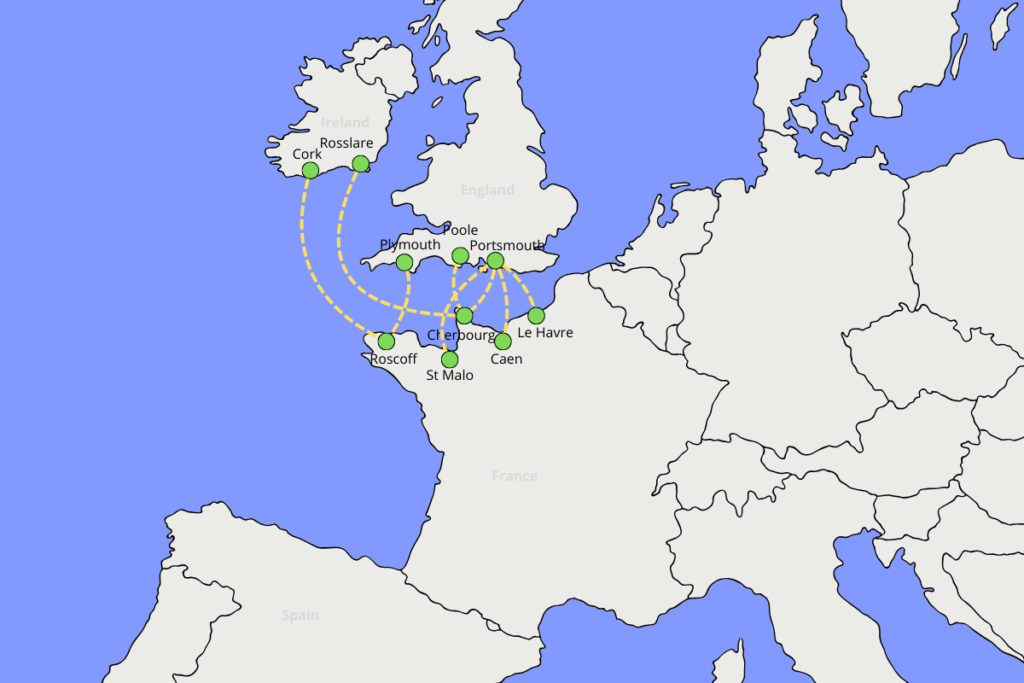The quickest way to drive to Spain is to take a ferry or the car train to France. From there, you can continue your journey by car. The shortest ferry crossing to France takes about 3 hours, and from there, it’s a 16-hour drive into Spain. Considering direct ferries from the UK to Spain typically take around 26 hours, this route offers a viable alternative for those travelling by car to Spain.
One downside of this alternative is the longer time spent driving. However, the advantage of a longer ferry journey is that your holiday begins the moment you step aboard, allowing you to arrive at your destination more relaxed. Explore the UK to Spain route map here, or see below for details on the shorter, more cost-effective ferries from the UK to France.
Crossing from England to France

The ferry crossings from the UK to France are significantly shorter, thus providing a great alternative to direct journeys from the UK to Spain. As shown in the image above, there are multiple ferries from Ireland and England to France. These options are not only shorter but also more affordable. Below, you’ll find information about these crossings, including journey times, starting prices, and the companies operating these routes.
| Crossing | Travel Duration | Starting Price* | Book a ticket with |
|---|---|---|---|
| Portsmouth – La Havre | 6 hours | £49 | Brittany Ferries (co.uk) |
| Portsmouth – Caen | 6 hours | £49 | Brittany Ferries (co.uk) |
| Portsmouth – CherBourg | 3 hours | £49 | Brittany Ferries (co.uk) |
| Portsmouth – St Malo | 10 hours and 45 minutes | £49 | Brittany Ferries (co.uk) |
| Poole – Cherbourg | 4 hours and 30 minutes | £49 | Brittany Ferries (co.uk) |
| Plymouth – Roscoff | 5 hours and 30 minutes | £49 | Brittany Ferries (co.uk) |
| Rosslare – Cherbourg | 17 hours | £23 | Brittany Ferries (ie) |
| Cork – Roscoff | 12 hours | £23 | Brittany Ferries (ie) |
| Dublin – Cherbourg | 18 hours | £77 | Irish Ferries |
Unsure which route best fits your travel plans? Utilise the booking module below to compare different crossings and find the cheapest or fastest option.
Or skip the ferry and take the Channel Tunnel
Alternatively, you can cross to France without a ferry by driving through the Channel Tunnel. The car train transports you across the channel in just 35 minutes.
The tunnel entrance is in Folkestone; you simply drive your car onto the train, which then takes you to Coquelles near Calais in 35 minutes. From Calais, you can drive to Barcelona in approximately 12 hours and 35 minutes. The table below provides travel times to other major Spanish cities:
- To Barcelona – 12 hours and 35 minutes
- To Valencia – 15 hours and 30 minutes
- To Madrid – 15 hours and 10 minutes
- To Sevilla – 19 hours and 30 minutes
Do bear in mind that tickets for the Channel Tunnel are generally more expensive than ferry tickets. However, this method offers considerable time savings and is the fastest route from England to Spain.
With the booking module below, you can easily check the cost of a Channel Tunnel ticket and compare prices with a ferry crossing.
Driving from France to Spain
Depending on your ferry arrival point in Northern France, you can easily continue your drive to Spain. You have options including Le Havre, Caen, Cherbourg, Saint-Malo, and Roscoff, each offering unique advantages as a starting point for your southward journey.
From these northern ports, various routes lead to Spain depending on your destination and preferences. A popular choice is the French motorways A10 and A63, passing through cities like Bordeaux and Bayonne before crossing into Spain at Irun. This route is efficient and features well-maintained roads.
Scenic Route
If you prefer a more scenic drive, consider taking the coastal route via Nantes and La Rochelle before joining the A10. This route offers stunning coastlines and the chance to stop at charming French villages and towns.
Traffic regulations
When planning your journey, it’s essential to consider some key differences in traffic regulations between France and the UK. For instance, you must always have a reflective vest and a warning triangle in your car in France. Also, be aware of different speed limits: the maximum speed on French motorways is typically 130 km/h in good weather and 110 km/h in poor weather. Additionally, remember that toll roads can make your journey quicker, though they come with additional costs.
Prefer a direct ferry crossing from the UK to Spain? You can explore the routes listed below:
The advantage of these crossings is that they allow you to arrive in Spain relaxed and refreshed, with your holiday starting the moment you step aboard the ferry. Although the ticket prices for these ferries are higher, you’ll save on fuel costs and avoid additional toll charges.